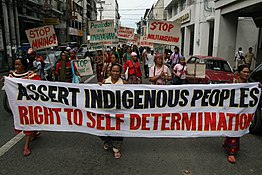
A | B | C | D | E | F | G | H | CH | I | J | K | L | M | N | O | P | Q | R | S | T | U | V | W | X | Y | Z | 0 | 1 | 2 | 3 | 4 | 5 | 6 | 7 | 8 | 9
| Rights |
|---|
 |
| Theoretical distinctions |
| Human rights |
| Rights by beneficiary |
| Other groups of rights |
| Part of a series on |
| Nationalism |
|---|
Self-determination[1] refers to a people's right to form its own political entity, and internal self-determination is the right to representative government with full suffrage.[2][3] Self-determination is a cardinal principle in modern international law, binding, as such, on the United Nations as an authoritative interpretation of the Charter's norms.[4][5] As a principle of international law, the right of self-determination recognized in the 1960s concerns the colonial context of territories' right to independence or another outcome of decolonization. The principle does not state how the decision is to be made, nor what the outcome should be, whether it be independence, federation, protection, some form of autonomy or full assimilation.[6] The internationally recognized right of self-determination does not include a right to an independent state for every ethnic group within a former colonial territory. While there is ongoing discussion about the rights of minorities and indigenous people who are denied political participation in representative governments and consequently suffer systematic violations of human rights as a group, no right to secession is recognized under international law.[7][8]

The concept was first expressed in the 1860s, and spread rapidly thereafter.[9] During and after World War I, the principle was encouraged by both Soviet Premier Vladimir Lenin and United States President Woodrow Wilson.[9] Having announced his Fourteen Points on 8 January 1918, on 11 February 1918 Wilson stated: "National aspirations must be respected; people may now be dominated and governed only by their own consent. 'Self determination' is not a mere phrase; it is an imperative principle of action."[10]
During World War II, the principle was included in the Atlantic Charter, jointly declared on 14 August 1941 by Franklin D. Roosevelt, President of the United States, and Winston Churchill, Prime Minister of the United Kingdom, who pledged The Eight Principal points of the Charter.[11] It was recognized as an international legal right after it was explicitly listed as a right in the UN Charter.[12]
Implementing the right to self-determination can be politically difficult, in part because there are multiple interpretations of what constitutes a people group and which groups may legitimately claim the right to self-determination.[13]

History
This section may contain original research or biased language and needs additional citations for verification. (March 2010) |
Pre-20th century
The norm of self-determination can be originally traced to the American and French revolutions.[14] The European revolutions of 1848, the post-World War I settlement at Versailles, and the decolonization movement after World War II shaped and established the norm.[15]
Empires

The world possessed several traditional, continental empires such as the Ottoman, Russian, Austrian/Habsburg, and the Qing Empire. Political scientists often define competition in Europe during the Modern Era as a balance of power struggle, which also induced various European states to pursue colonial empires, beginning with the Spanish and Portuguese, and later including the British, French, Dutch, and German. During the early 19th century, competition in Europe produced multiple wars, most notably the Napoleonic Wars. After this conflict, the British Empire became dominant and entered its "imperial century", while nationalism became a powerful political ideology in Europe.
Later, after the Franco-Prussian War in 1870, "New Imperialism" was unleashed with France and later Germany establishing colonies in Middle East, Southeast Asia, the South Pacific, and Africa. Japan also emerged as a new power. Multiple theaters of competition developed across the world:
- Africa: numerous European states competed for colonies in the "Scramble for Africa";
- Central Asia: Russia and Britain competed for domination in the "Great Game"
- East Asia: colonies and various spheres of influence were established, largely to the detriment of the Qing Empire.
The Ottoman Empire, Austrian Empire, Russian Empire, Qing Empire and the new Empire of Japan maintained themselves, often expanding or contracting at the expense of another empire. All ignored notions of self-determination for those governed.[16]
In the 16th century the Spanish professor of law at the University of Salamanca wrote: "Toda nación tiene derecho a gobernarse a sí misma y puede aceptar el régimen político que quiera, aún cuando no sea el mejor. All nations have the right to govern themselves and can accept the political regime it wants, even if it is not the best."[17]
Rebellions and emergence of nationalism
| Part of a series on |
| Nationalism |
|---|
